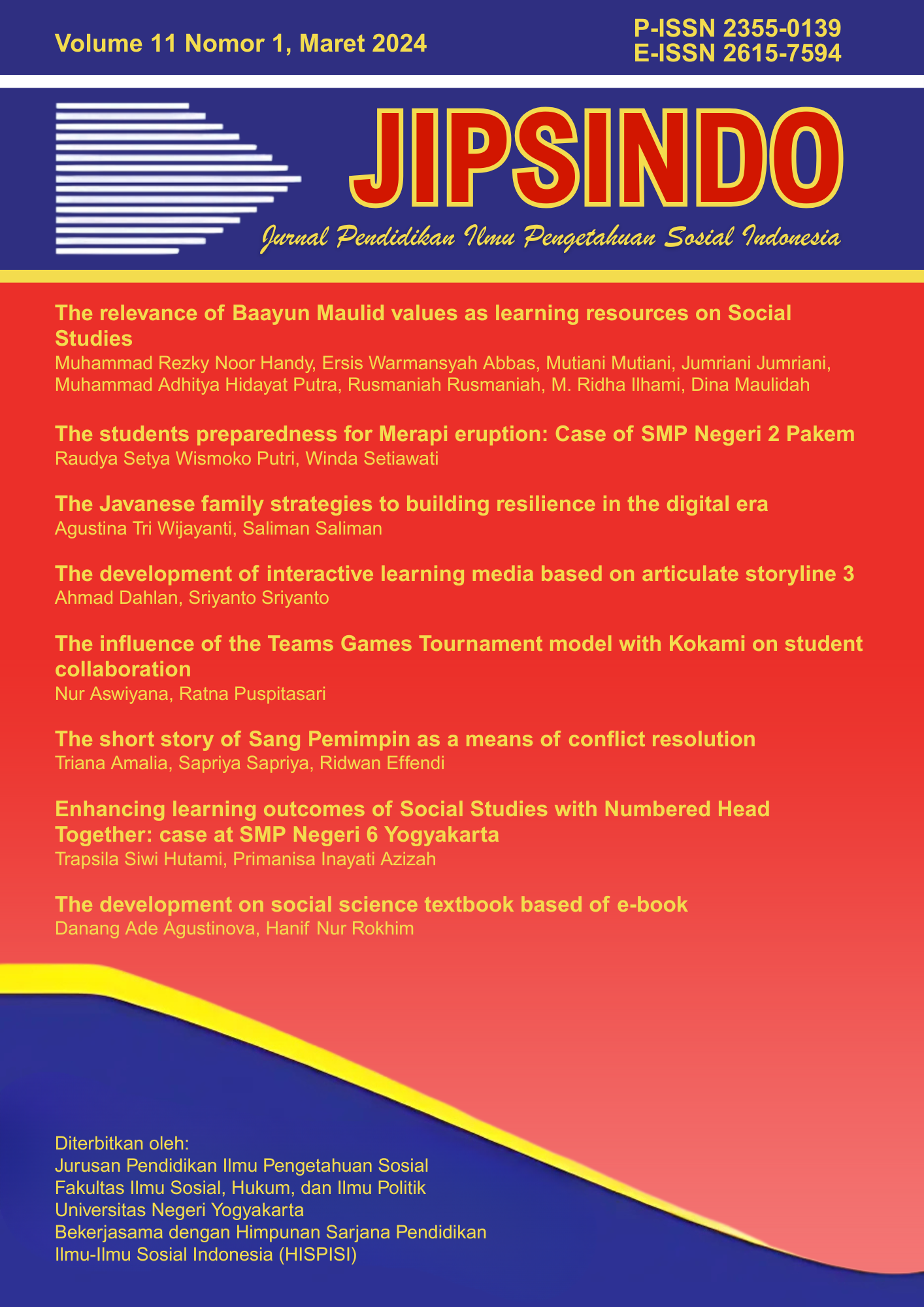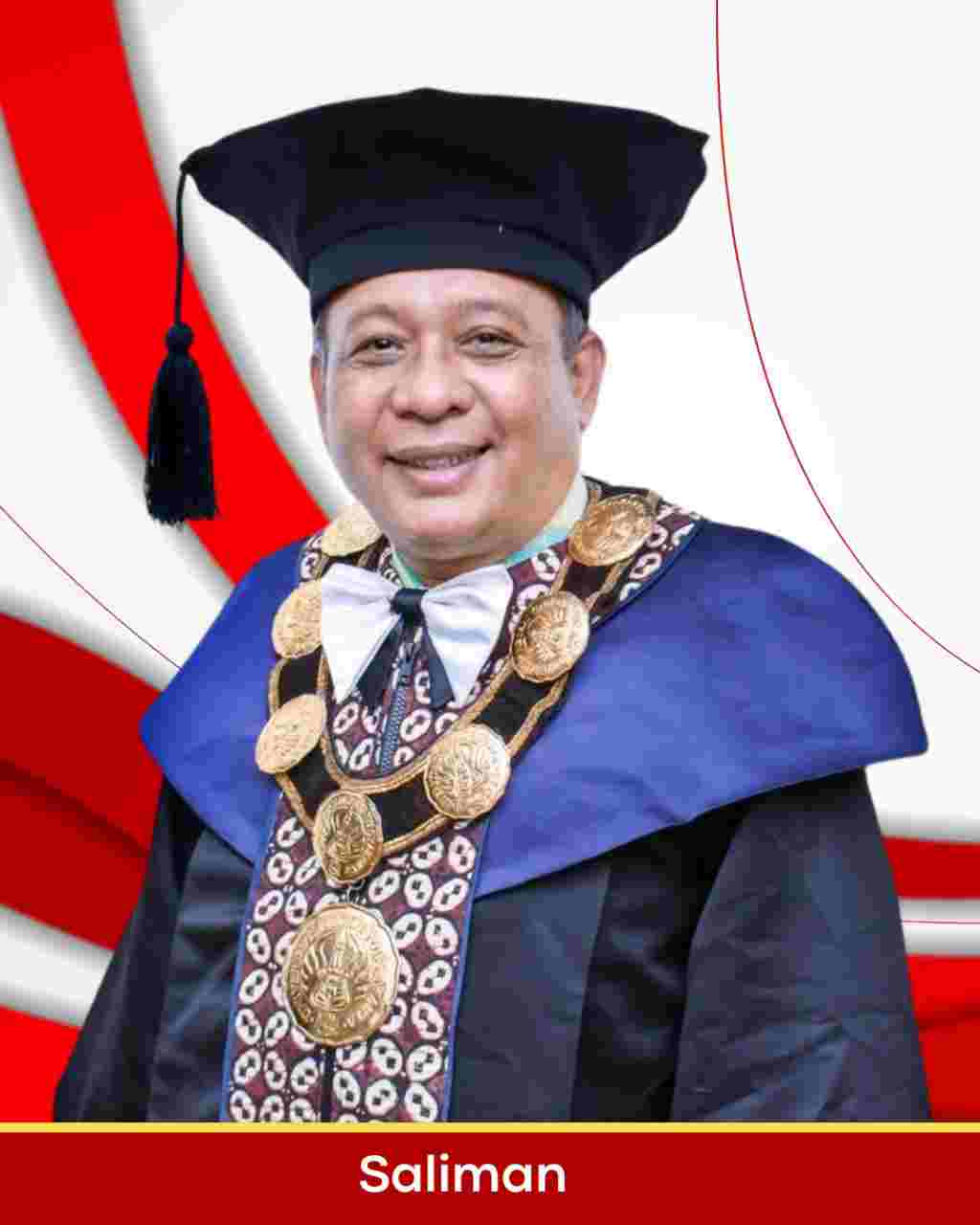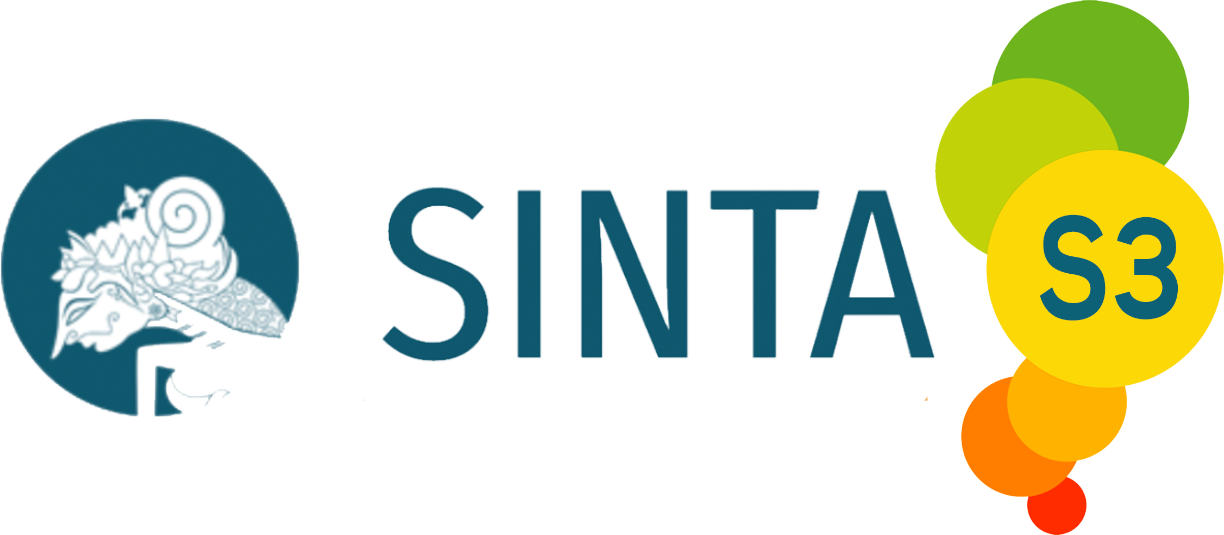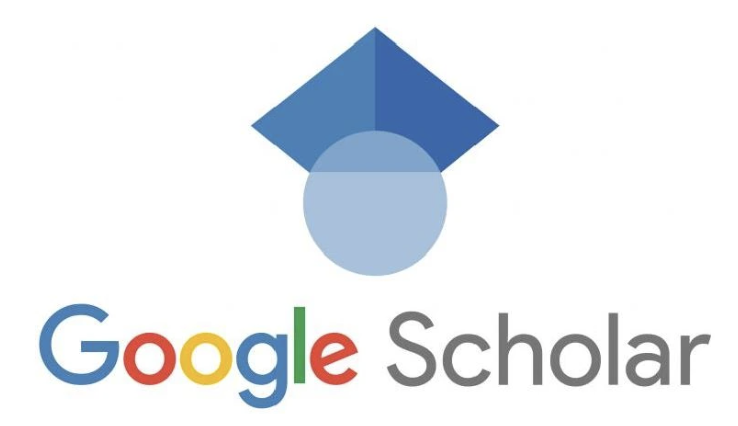Technological pedagogical content knowledge (TPACK) calon guru di Tasikmalaya
DOI:
https://doi.org/10.21831/jipsindo.v9i2.52050Keywords:
TPACK, History Teacher Candidate, Tasikmalaya, History Learning, Industrial Revolution 4.0Abstract
Penelitian ini bertujuan untuk menjelaskan pemahaman mahasiswa calon guru di Tasikmalaya mengenai Technological Pedogogical Content Knowledge (TPACK). Penelitian ini termasuk ke dalam penelitian kuantitatif dengan metode survei. Adapun responden dalam penelitian ini merupakan mahasiswa jurusan Pendidikan Sejarah pada sebuah nniversitas negeri di Tasikmalaya yang telah menempuh mata kuliah Praktek Lapangan Persekolahan (PLP) atau telah mengikuti program Kampus Mengajar Kementerian Pendidikan Kebudayaan, Riset, Teknologi, dan Pendidikan Tinggi. Berdasarkan hasil penelitian, secara umum responden telah memiliki pemahaman yang cukup baik dalam tujuh komponen TPACK. Meskipun demikian, terdapat komponen yang perlu ditingkatkan seperti Technological Content Knowledge. Dengan demikian, dapat ditarik kesimpulan jika mahasiswa calon guru sejarah di Tasikmalaya telah menguasai konsep TPACK sehingga memiliki kesiapan dalam melaksanakan pembelajaran sejarah di era Revolusi Industri 4.0 ini.
Techno-pedagogical content knowledge on teacher candidate di Tasikmalaya
This study aims to explain the understanding of prospective history teacher students in Tasikmalaya regarding Technological Pedogogical Content Knowledge (TPACK). This research is included in quantitative research with survey method. The respondents in this study were pre-service teacher at state university in Tasikmalaya who had taken School Field Practice (PLP) course or have joined the Kampus Mengajar program held by Ministry of Education, Culture, Research, Technology, and Higher Education. Based on the results of the study, in general, respondents have a good understanding of the seven components of TPACK. However, there are components that need to be improved such as Technological Content Knowledge. Thus, it can be concluded that prospective history teacher students in Tasikmalaya have mastered the TPACK concept so that they are prepared to carry out history learning in this 4.0 Industrial Revolution era.
References
Afwan, B., Suryani, N., & Ardianto, D. T. (2020). Analisis Kebutuhan Pembelajaran Sejarah di Era Digital. Proceding Literasi Dalam Pendidikan Di Era Digital Untuk Generasi Milenial, 97–108. Retrieved From http://journal.um-surabaya.ac.id/index.php/Pro/article/view/4813
Ammade, S., Mahmud, M., Jabu, B., & Tahmir, S. (2020). TPACK Model Based Instruction in Teaching Writing: An Analysis on TPACK Literacy. International Journal of Language Education, 129–140. https://doi.org/10.26858/ijole.v4i2.12441
Durdu, L., & Dag, F. (2017). Pre-Service Teachers' TPACK Development and Conceptions through a TPACK-Based Course. Australian Journal of Teacher Education, 42(11), 150–171. https://doi.org/10.14221/ajte.2017v42n11.10
Esposito, M., & Moroney, R. (2020). Teacher Candidates' Perception of Acquiring TPACK in the Digital Age through an Innovative Educational Technology Masters Program. Journal for Leadership and Instruction, 19(1), 25–30. Retrieved From https://eric.ed.gov/?id=EJ1255873
Hardisky, M. (2018). TPACK: Technology Integration and Teacher Perceptions. In ProQuest LLC (Issue March). Drexel University.
Koehler, M. J., & Mishra, P. (2006). Technological Pedagogical Content Knowledge: A Framework for Teacher Knowledge. Teachers College Record, 108(6), 1017–1054. https://doi.org/10.1111/j.1467-9620.2006.00684.x
Nasution, S. H. (2018). Pentingnya Literasi Teknologi Bagi Mahasiswa Calon Guru Matematika. JKPM: Jurnal Kajian Pembelajaran Matematika, 2(1), 14–18. http://dx.doi.org/10.17977/um076v2i12018p14-18
Afwan, B., Suryani, N., & Ardianto, D. T. (2020). Analisis Kebutuhan Pembelajaran Sejarah di Era Digital. Proceding Literasi Dalam Pendidikan Di Era Digital Untuk Generasi Milenial, 97–108. Retrieved From http://journal.um-surabaya.ac.id/index.php/Pro/article/view/4813
Ammade, S., Mahmud, M., Jabu, B., & Tahmir, S. (2020). TPACK Model Based Instruction in Teaching Writing: An Analysis on TPACK Literacy. International Journal of Language Education, 129–140. https://doi.org/10.26858/ijole.v4i2.12441
Durdu, L., & Dag, F. (2017). Pre-Service Teachers' TPACK Development and Conceptions through a TPACK-Based Course. Australian Journal of Teacher Education, 42(11), 150–171. https://doi.org/10.14221/ajte.2017v42n11.10
Esposito, M., & Moroney, R. (2020). Teacher Candidates' Perception of Acquiring TPACK in the Digital Age through an Innovative Educational Technology Masters Program. Journal for Leadership and Instruction, 19(1), 25–30. Retrieved From https://eric.ed.gov/?id=EJ1255873
Hardisky, M. (2018). TPACK: Technology Integration and Teacher Perceptions. In ProQuest LLC (Issue March). Drexel University.
Koehler, M. J., & Mishra, P. (2006). Technological Pedagogical Content Knowledge: A Framework for Teacher Knowledge. Teachers College Record, 108(6), 1017–1054. https://doi.org/10.1111/j.1467-9620.2006.00684.x
Nasution, S. H. (2018). Pentingnya Literasi Teknologi Bagi Mahasiswa Calon Guru Matematika. JKPM: Jurnal Kajian Pembelajaran Matematika, 2(1), 14–18. http://dx.doi.org/10.17977/um076v2i12018p14-18
Nofrion, Wijiyanto, B., Wilis, R., & Novio, R. (2018). Analisis Technological Pedagogical and Content Knowledge (TPACK) Guru Geografi di Kabupaten Solok, Sumatera Barat. Geografi, 10(2), 105–116.
Nuangchalerm, P. (2020). TPACK in ASEAN perspectives: Case study on Thai pre-service teacher. International Journal of Evaluation and Research in Education (IJERE), 9(4), 993. https://doi.org/10.11591/ijere.v9i4.20700
Padmavathi, M. (2017). Preparing Teachers For Technology Based Teaching. Journal on School Educational Technology, 12(3), 1–9.
Prasetyo, B., & Trisyanti, U. (2018). Revolusi Industri 4.0 dan Tantangan Perubahan Sosial. IPTEK: Journal of Proceedings Series, 5, 22–27.
Supriyadi, S., Bahri, S., & Waremra, R. S. (2018). Kemampuan Technological Pedagogical Content Knowledge (TPACK) Mahasiswa Pada Matakuliah Strategi Belajar Mengajar Fisika. Jurnal Inspirasi Pendidikan, 8(2), 1–9. https://doi.org/10.21067/jip.v8i2.2632
Tanjung, S., & Supriatna, N. (2021). Literasi Kreatif: Membangun Keterampilan Abad 21 Melalui Pembelajaran Sejarah Lokal Kesultanan Langkat. Harmony: Jurnal Pembelajaran IPS Dan PKN, 6(2), 101–109.
Nofrion, Wijiyanto, B., Wilis, R., & Novio, R. (2018). Analisis Technological Pedagogical and Content Knowledge (TPACK) Guru Geografi di Kabupaten Solok, Sumatera Barat. Geografi, 10(2), 105–116.
Nuangchalerm, P. (2020). TPACK in ASEAN perspectives: Case study on Thai pre-service teacher. International Journal of Evaluation and Research in Education (IJERE), 9(4), 993. https://doi.org/10.11591/ijere.v9i4.20700
Padmavathi, M. (2017). Preparing Teachers For Technology Based Teaching. Journal on School Educational Technology, 12(3), 1–9.
Prasetyo, B., & Trisyanti, U. (2018). Revolusi Industri 4.0 dan Tantangan Perubahan Sosial. IPTEK: Journal of Proceedings Series, 5, 22–27.
Supriyadi, S., Bahri, S., & Waremra, R. S. (2018). Kemampuan Technological Pedagogical Content Knowledge (TPACK) Mahasiswa Pada Matakuliah Strategi Belajar Mengajar Fisika. Jurnal Inspirasi Pendidikan, 8(2), 1–9. https://doi.org/10.21067/jip.v8i2.2632
Tanjung, S., & Supriatna, N. (2021). Literasi Kreatif: Membangun Keterampilan Abad 21 Melalui Pembelajaran Sejarah Lokal Kesultanan Langkat. Harmony: Jurnal Pembelajaran IPS Dan PKN, 6(2), 101–109.
Downloads
Published
How to Cite
Issue
Section
Citation Check
License
Authors who publish with this journal agree to the following terms:
- Authors retain copyright and grant the journal right of first publication with the work simultaneously licensed under a Creative Commons Attribution License that allows others to share the work with an acknowledgement of the work's authorship and initial publication in this journal.
- Authors are able to enter into separate, additional contractual arrangements for the non-exclusive distribution of the journal's published version of the work (e.g., post it to an institutional repository or publish it in a book), with an acknowledgement of its initial publication in this journal.
- Authors are permitted and encouraged to post their work online (e.g., in institutional repositories or on their website) prior to and during the submission process, as it can lead to productive exchanges, as well as earlier and greater citation of published work (See The Effect of Open Access).

JIPSINDO (Jurnal Pendidikan Ilmu Pengetahuan Sosial Indonesia) is licensed under a Creative Commons Attribution-ShareAlike 4.0 International License.
Based on a work at https://journal.uny.ac.id/index.php/jipsindo.
















